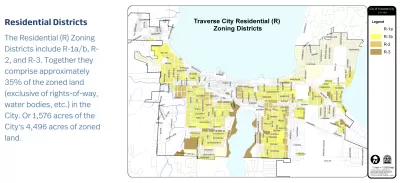Zoning changes for everything from housing density to minimum lot sizes are under consideration for a city on the shores of Lake Michigan.

Traverse City, Michigan is considering a package of zoning changes that would increase housing density and diversity by removing the existing cap on the number of allowable accessory dwelling units, among other changes.
“ADUs are currently capped at 15 annually, a number City Planning Director Shawn Winter has called ‘completely arbitrary,’” according to an article by Beth Milligan. “Another change would lift an owner occupancy requirement on ADUs, which stipulates that the property owner must live full-time in either the main house or the ADU.”
ADUs aren’t the only subject of the changes, however. The changes also “include allowing ADUs with a duplex, reducing the minimum land area for cluster housing, and allowing duplexes by right in the R-1a/b residential districts – which make up nearly 83 percent of all residential land in the city,” reports Milligan. “Triplexes and quadplexes would be allowed by right in the R-2 district, with ADUs allowed with duplexes and triplexes in R-2. The proposal also reduces the minimum lot width and area in the R-1a/b districts and allows two homes to be built on a lot that is twice the minimum area without being split.”
Opponents, organized under the moniker of the Alliance of Citizens for Traverse City have launched a website that describes the series of reforms as “blanket changes” and criticizing the market-based approach to housing. “Other cities that implemented these blanket zoning changes experienced skyrocketing property values (and taxes), gentrification, and loss of green spaces,” reads the website without mentioning specifics.
Research on the effects of ADU legalization and reduced minimum lot sizes was published by the Office of Policy Development and Research’s Cityscape journal.
The city’s planning commission approved the changes earlier this year. A public hearing conducted by the city commission earlier this week attracted a crowd ahead of an October 16 deadline for a date.
FULL STORY: Housing Zoning Changes Go Before City Commission

Study: Maui’s Plan to Convert Vacation Rentals to Long-Term Housing Could Cause Nearly $1 Billion Economic Loss
The plan would reduce visitor accommodation by 25,% resulting in 1,900 jobs lost.

North Texas Transit Leaders Tout Benefits of TOD for Growing Region
At a summit focused on transit-oriented development, policymakers discussed how North Texas’ expanded light rail system can serve as a tool for economic growth.

Using Old Oil and Gas Wells for Green Energy Storage
Penn State researchers have found that repurposing abandoned oil and gas wells for geothermal-assisted compressed-air energy storage can boost efficiency, reduce environmental risks, and support clean energy and job transitions.

Santa Barbara Could Build Housing on County Land
County supervisors moved forward a proposal to build workforce housing on two county-owned parcels.

San Mateo Formally Opposes Freeway Project
The city council will send a letter to Caltrans urging the agency to reconsider a plan to expand the 101 through the city of San Mateo.

A Bronx Community Fights to Have its Voice Heard
After organizing and giving input for decades, the community around the Kingsbridge Armory might actually see it redeveloped — and they want to continue to have a say in how it goes.
Urban Design for Planners 1: Software Tools
This six-course series explores essential urban design concepts using open source software and equips planners with the tools they need to participate fully in the urban design process.
Planning for Universal Design
Learn the tools for implementing Universal Design in planning regulations.
Ascent Environmental
Borough of Carlisle
Institute for Housing and Urban Development Studies (IHS)
City of Grandview
Harvard GSD Executive Education
Toledo-Lucas County Plan Commissions
Salt Lake City
NYU Wagner Graduate School of Public Service





























